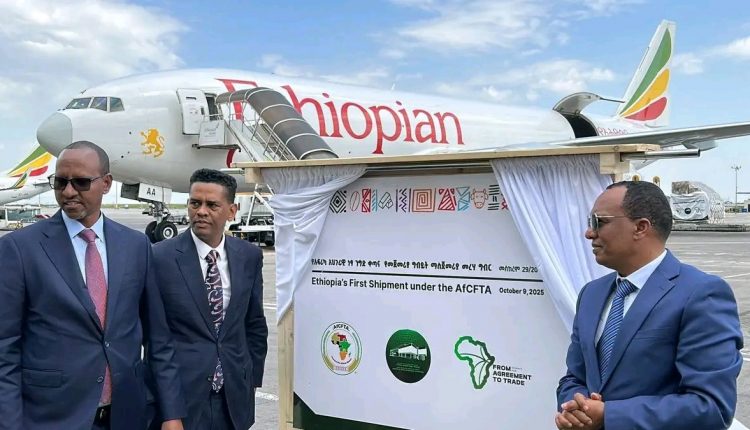Ethiopia Begins Export of Goods Under AfCFTA Trade Framework
Addis Ababa, October 9, 2025 (FMC) — Ethiopia has achieved a significant economic milestone by officially commencing the export of goods under the African Continental Free Trade Area (AfCFTA) framework.
The first shipment, consisting of meat, fruits, and other agricultural products, was dispatched to Somalia, Kenya, and South Africa through both land and air routes. The development marks Ethiopia’s entry into the continent’s unified trade system and reflects its readiness to tap into the vast African market.
Speaking at a symbolic dispatch ceremony held today, Trade and Regional Integration Minister Kassahun Goffe described the launch as a *“major milestone in Ethiopia’s trade journey”* and a testament to the country’s growing participation in one of the world’s most ambitious trade initiatives.
The AfCFTA, established under the African Union (AU) framework in 2018, seeks to create a single continental market for goods and services and to ensure the free movement of businesspersons and investments. According to Kassahun, the agreement unites 55 AU member states with a combined population exceeding 1.4 billion and a collective GDP of more than 3.4 trillion USD.
He emphasized that, as Africa’s second most populous nation and a strategic gateway to the Horn of Africa, Ethiopia stands to benefit greatly from the AfCFTA through expanded market access, export diversification, and the removal of trade barriers across the continent.
“The AfCFTA is more than a trade agreement,” Kassahun noted. “It is a cornerstone of Africa’s Agenda 2063, advancing our shared vision of a prosperous, integrated, and peaceful continent.”
The continental pact is expected to boost intra-African trade, enhance industrial competitiveness, and accelerate inclusive growth and industrialization across member states.
Prosperity Party Vice President and Head of the Democratic System Building Coordination Center, with the rank of Deputy Prime Minister, Adem Farah, said the launch signifies more than just the start of a new trade regime.
“This ceremony is not merely about commencing trade,” Adem said. “It reaffirms Ethiopia’s vanguard role in African affairs — now in trade and economic integration — and strengthens our partnership with our African brothers and sisters.”
He underlined that the current era requires African nations to sustain cooperation through economic sovereignty, mutual trade linkages, and shared prosperity.
By implementing the AfCFTA, Ethiopia is upholding its long-standing conviction that *“Africa’s destiny must be shaped through the cooperation of Africans,”* Adem stated.
“Our national vision of building an Ethiopia where holistic prosperity prevails cannot be achieved in isolation,” he added. “The 21st century demands interconnected markets, efficient logistics, and regional value chains that deliver tangible benefits to our citizens.”
Adem further noted that Ethiopia’s transition from ratification to practical implementation of the AfCFTA reflects the government’s tradition of translating commitments into action.
AfCFTA Secretary-General Wamkele Mene commended Ethiopia’s move, describing it as “not only a national milestone but also a testament to Africa’s determination to turn the AfCFTA from vision into reality.”
He praised Ethiopia’s strong political will and institutional coordination, emphasizing that its active participation will enhance value addition, stimulate industrial growth, and deepen its economic integration with the rest of Africa.

